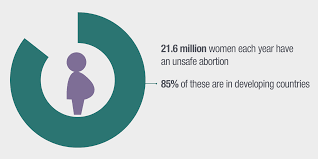Global Gag Rule impacts access to quality health care services: Study

By A Staff Reporter, Kathmandu, June 3: The Global Gag Rule (GGR) has reduced the access to and the quality of sexual and reproductive health services, undermined reproductive rights, and silenced the voices of civil society organisations in Nepal, says a study.
While progress has been made, the GGR, a US policy that prohibits funding to non-governmental organisations that provide, refer, counsel, or advocate for abortion care, has undermined government efforts and reduced access to care, the report stated.
Nepal government is committed to increasing access to sexual and reproductive health and rights, particularly in remote regions. As a result, the country has liberalised its abortion laws and sought to increase access to contraceptives.
“The impacts of the GGR continue to reduce access to critical health care services in Nepal. Apart from this, this policy has created funding gaps, weakened partnerships and coalitions between organisations and silenced voices of civil societies” said Dr. Mahesh Puri, Co-Director of CREHPA, a lead author of the study talking to The Rising Nepal.
He said that due to early termination of USAID supported programme, many aspects of family planning services have stopped in 22 districts and witnessed gaps in service coverage and worsening the quality of services.
Similary, the GGR adds challenges not only to expanding and improving the quality of sexual and reproductive healthservices, but also to sustainingthe progress already made and meeting the SDGs, Dr. Puri added.
The study found that the implementation of the expanded GGR is widening gaps in availability and accessibility of sexual and reproductive health and rights services and utilisation, which predominantly affects already marginalised and underserved populations.
The policy has affected both the training being provided to health workers on family planning and supply of family planning commodities, ultimately causing decreases in quality of care, disruption of partnerships and coalition networks of sexual and reproductive health and rights organisations and limitations on how civil society can work together effectively and efficiently.
Four organisations that declined to comply with the policy experienced funding cuts.
It had limited options to work together, lost resources and scaled down their programme.
Similar to last year, silencing of voices on abortion continued across United States government funded organisations, which creates a challenging situation for women to exercise their reproductive rights.
Though the government is committed to providing quality health care services to its people, challenges like limited capacity in funds and technical human resources to provide health care is limiting the government’s efforts.
Moreover, budget allocation has not increased substantially enough to accelerate progress in health sector. Hence, support from external developmental partners, NGOs and INGOs is essential.
However, because of the GGR, national and international organisations working on sexual and reproductive health and rights including abortion in Nepal have been experiencing negative impacts to their organisations and their work.
The study was jointly conducted by the Center for Research on Environment, Health, and Populations Activities (CREHPA) and the International Women’s Health Coalition (IWHC).
Recent News

Do not make expressions casting dout on election: EC
14 Apr, 2022
CM Bhatta says may New Year 2079 BS inspire positive thinking
14 Apr, 2022
Three new cases, 44 recoveries in 24 hours
14 Apr, 2022
689 climbers of 84 teams so far acquire permits for climbing various peaks this spring season
14 Apr, 2022
How the rising cost of living crisis is impacting Nepal
14 Apr, 2022
US military confirms an interstellar meteor collided with Earth
14 Apr, 2022
Valneva Covid vaccine approved for use in UK
14 Apr, 2022
Chair Prachanda highlights need of unity among Maoist, Communist forces
14 Apr, 2022
Ranbir Kapoor and Alia Bhatt: Bollywood toasts star couple on wedding
14 Apr, 2022
President Bhandari confers decorations (Photo Feature)
14 Apr, 2022











